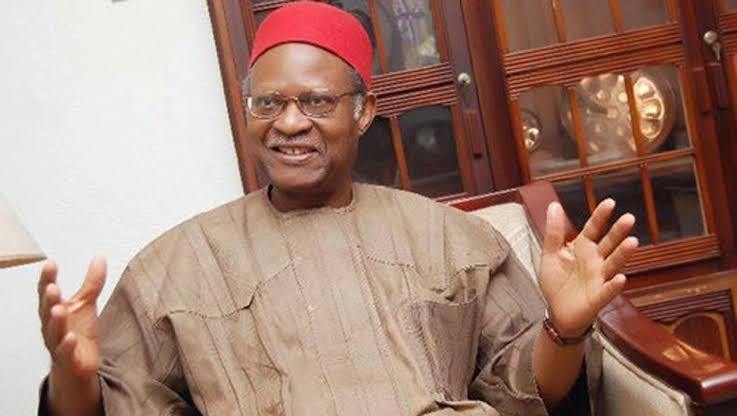Former Common – wealth SecretaryGeneral, Chief Emeka Anyaoku, yesterday said that if Nigeria fails to change the 1999 Constitution, development will continue to elude the country.
Speaking at the launch of the book: ‘The Noble Academic and Patriot: A Biography of Emeritus Professor Akinjide Osuntokun,’ in Lagos, Anyaoku said the 1999 Constitution is more of a Unitary Constitution.
Anyaoku said Nigeria, like many other countries across the world, was a pluralistic country whose population comprised peoples long established in their separate geographical areas with different histories, cultures, languages and religions.
He argued that united and progressive pluralistic countries were those who addressed their diversity with true federal constitutions. “Jide Osuntokun is a true patriot because he loves our country and believes in its future.
As a fellow patriot, I would like at this point to reiterate briefly the view that I have expressed on many previous occasions on how the unity and future of our country can best be assured.
“I start from the undeniable fact that Nigeria, like many other countries across the world, is a pluralistic country, which is a country whose population consists of groups of peoples long established in their separate geographical areas with different histories, cultures, languages and religions.
“The universal lesson is that pluralistic countries which have survived as sin – gle political entities in unity and progress are those that addressed their pluralism, that is their diversity, with genuine federal constitutions.
Examples of such countries are India, Canada and Switzerland. “The other pluralistic countries which failed to manage their pluralism with true federal constitutions eventually disintegrated.
Examples of these include Yugoslavia which after 74 years of existence broke into seven sovereign countries, Czechoslovakia which separated into two independent states, East Timor which separated from Indonesia, and coming nearer home in Africa, Sudan which broke into two separate countries after almost three thousand years of existence.
“I believe therefore that if our pluralistic Nigeria is to achieve true unity and political stability, and to successfully tackle the serious challenges that the country currently faces, it must have a truly federal constitution.
“To those who think that the trouble with Nigeria today is the political leadership, I would say that as long as we have the 1999 Constitution as our ground norm, not even Angel Gabriel or Malaikah Jibril as leaders, can successfully tackle the divisiveness, the underper – forming economy with the resultant poverty, the insecurity, the humongous corruption, and the other major challenges currently facing Nigeria.”
Anyaoku insisted that there must be a true Nigerian peoples’ democratic constitution based on the principles that underlined the 1960 and 1963 constitutions which were painstakingly negotiated and agreed by the founding fathers of independent Nigeria.
“As many of us here in this room will remember, Nigeria was more united, more stable and developing towards achieving its potential under that constitution until the military intervened in the country’s governance in January 1966 and introduced the unitary constitution that has virtually existed, albeit in different forms, until today.”















